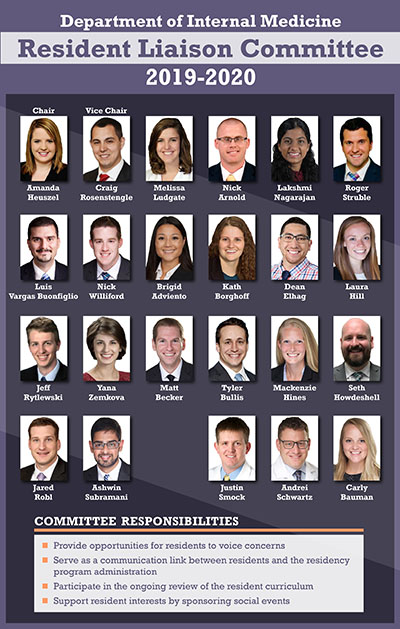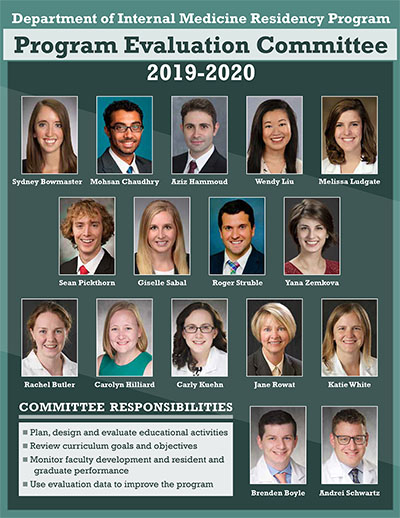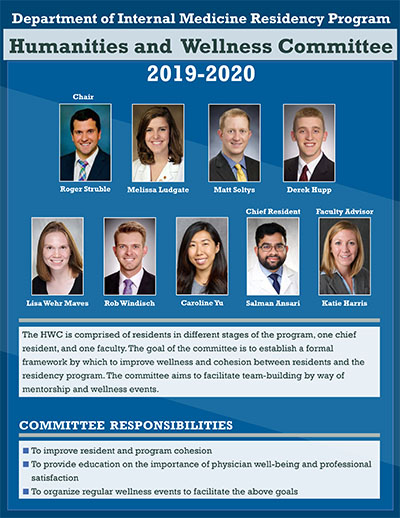For more than 80 years, the Internal Medicine Residency Program has focused on equipping residents with the skills and experiences they need to succeed as physicians. As part of the ongoing drive for excellence, the residency program directed by Manish Suneja, MD, has resident-led committees to provide avenues for feedback and improvement. Committees such as the Resident Liaison Committee, the Program Evaluation Committee, the Wellness and Humanities Committee, the Scholarship Committee, and the Clinical Competency Committee are some examples.
“At Iowa, a core value is communication,” Suneja said. “It’s important to us that we build systems within the residency program that allows residents and interns to have a voice in shaping their training as well as the future of the program.”
PGY-3 resident Roger Struble, MD, is a member of the Resident Liaison, Program Evaluation, and Wellness and Humanities committees.
“Iowa is a special place for many reasons,” Struble said. “We care about our community and champion compassion. The committees that we have in place allow us to empower residents to make positive changes to our program. These are formal settings where problems can be identified, resolutions discussed, and big ideas may come together to enact change.”
As a formal channel of communication between the residents and program leadership, the Resident Liaison Committee serves as the voice for resident concerns. The committee is made up of 20 residents, a Chief Resident and faculty, also reviews resident curriculum. Chair and PGY-2 Amanda Heuszel, MD, and Vice Chair PGY-3 Craig Rosenstengle, MD, help direct the committee’s aims. Chief Resident Andrei Schwartz, MD, and Associate Program Director Justin Smock, MD, are the two faculty supervisors for the committee.
A team of 16 residents, Chief Residents, and faculty, the Program Evaluation Committee plans, designs, and evaluates educational activities and curriculum goals. Chaired by Education Development Director Jane Rowat, MS, and Katherine White, MD, MME, the committee monitors faculty development and resident performance using data from evaluations.



Although smaller than the other committees, the Wellness and Humanities Committee is just as essential to the success, and well-being, of the resident program. Chaired by Struble and Associate Program Director Katherine Harris, MD, the committee works to create more cohesion in the resident programs as well as educating residents about the importance of physician health and professional satisfaction .
“The Humanities and Wellness Committee is our newest committee and is still learning the best ways we can impact the lives of our residents,” Struble said. “Residents are not just doctors in training; we are people with hobbies, families, friends. Our committee wants to forge friendship among residents with non-mandatory, fun activities both inside and outside of work where residents can bond and connect.”
Salman Ansari, MD, Chief Resident adviser on the Humanities and Wellness Committee agrees with Struble. “I think it is unique in striving to find innovative approaches to improve and maintain program cohesion. Although more readily understood as wellness, we think a better measure of resident well-being is actually how connected we feel to each other, and that’s what we’re trying to focus on. We also believe delving into medical humanities, like our recent ethics noon conference, helps to foster meaning and joy in our practices.”
The committee plans pumpkin carvings, Friendsgiving events, sledding nights, gift exchanges, TV watch parties and trivia nights. Currently, the committee is planning a donation drive where all contributions will go to a local shelter.
One comment on “Residency committees create continuous improvement”